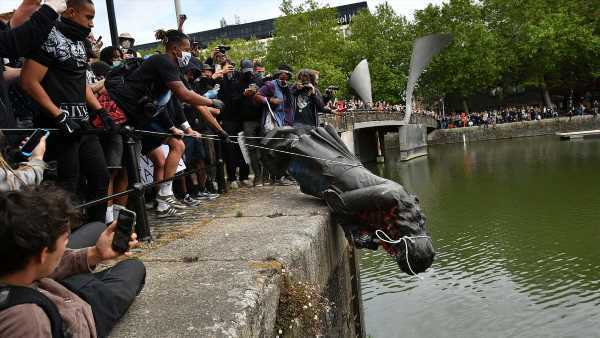
Statues are NOT history because they are ‘always silent about the victims’ and were put up by ‘members of a tiny male elite’, historian David Olusoga says
- Professor Olusoga was responding to newly-released Government guidance
- The ‘retain and explain’ approach encourages institutions to retain monuments
Statues are not history because they are ‘always silent about the victims’ and were put up by ‘members of a tiny male elite’, historian David Olusoga has claimed.
The academic, who is currently fronting a BBC documentary on the history of the UK, was responding to questions about the Government’s ‘retain and explain’ approach to contentious statues.
The strategy was initially unveiled in 2021 in following the toppling of the statue of slave trader Edward Colston in Bristol during the Black Lives Matter protests in 2020.
Official guidance telling institutions to adopt the approach in the face of calls for statues’ removal or relocation was released today.
Responding on BBC Radio 4’s Today Programme, Professor Olusoga said ‘in some cases’ adding context to controversial statues is appropriate, but added: ‘Why would you want a statue of a man who was a mass murderer or a slave trader on public display?’
He said statues are ‘validation and memorialisation’ rather than history and agreed that some should be removed from public display and put in museums.
Statues are not history because they are ‘always silent about the victims’ and were put up by ‘tiny members of a male elite’, historian David Olusoga has claimed. Above: The toppling of the statue of slave trader Edward Colston into Bristol harbour in 2020
READ MORE: Plaques explaining slave trade links will be added to Guildhall statues of William Beckford and Sir John Cass
The new guidance was published by Culture Secretary Lucy Frazer.
It calls for a full explanation to be added to controversial statues so that a ‘fuller understanding of the historic context can be known, understood and debated.’
The guidance was formulated with the help of academics and heritage experts on the government-appointed Heritage Advisory Board.
If institutions do decide to relocate a statue, they will have to apply for planning permission.
The toppling of Colston’s statue into Bristol harbour by four protesters sparked huge debate and controversy.
The protesters were later found not guilty of causing criminal damage.
Dozens of other statues have faced calls for removal, including one at Oxford University of imperialist Cecil Rhodes.
The ‘Rhodes Must Fall’ campaign ultimately proved to be a failure in 2021, when it was decided the statue would remain in place at Oriel College because of the difficulty of removing it.
Professor Olusgoa told the BBC’s Amol Rajan: ‘Statues are not history. They cannot teach us our history.
‘They are always silent about the victims and they are put up by members of a tiny male elite to celebrate the lives of other members of that tiny male elite.’
The TV presenter, who is currently fronting a BBC documentary on the history of the UK, was responding to questions about the Government’s ‘retain and explain’ approach to contentious statues
He added that he has a ‘problem’ with the new Government guidance because it ‘regurgitates two falsehoods’.
‘The first is that the problem with statues is modern attitudes changing, which implies people approved of these statues and of these men at the time,’ he said.
‘And that is often demonstrably untrue. And the other is that statues tell us our history.
‘The advice says that removing heritage will limit our understanding of difficult parts of our history.
‘Which statue can we point to that tells us about a difficult part of our history?’
Professor Olusgoa was also asked about the statue of wartime Prime Minister Sir Winston Churchill which stands in Parliament Square and was vandalised during the Black Lives Matter protests in 2020.
He said the monument ‘says nothing’ about Churchill’s flaws or achievements in helping to win the Second World War.
‘All it says is “here is a great man”,’ he said.
‘Now in many ways Churchill was a great man, he was also a very troubling figure in all sorts of ways.
Professor Olusgoa was also asked about the statue of wartime Prime Minister Sir Winston Churchill which stands in Parliament Square and was vandalised during the Black Lives Matter protests in 2020
‘That complexity is exactly the point, you learn that from history books, I would like to think you learn it from documentaries. A statue cannot tell you that.’
The academic is the presenter of new BBC Two programme Union with David Olusoga.
The Government’s new guidance also claims that the removal of statues risks ‘limiting our understanding of the difficult parts of our history.’
Ms Frazer said: ‘History is nuanced and complex. It is full of grey areas, which is what makes it so interesting and, of course, there are times when statues and monuments depict people or events that we very much disapprove of today.
‘At the same time, the UK has a proud history as an engine for progress, democracy and liberal values.
‘That is why I want all our cultural institutions to resist being driven by any politics or agenda and to use their assets to educate and inform rather than to seek to erase the parts of our history that we are uncomfortable with.
Source: Read Full Article


